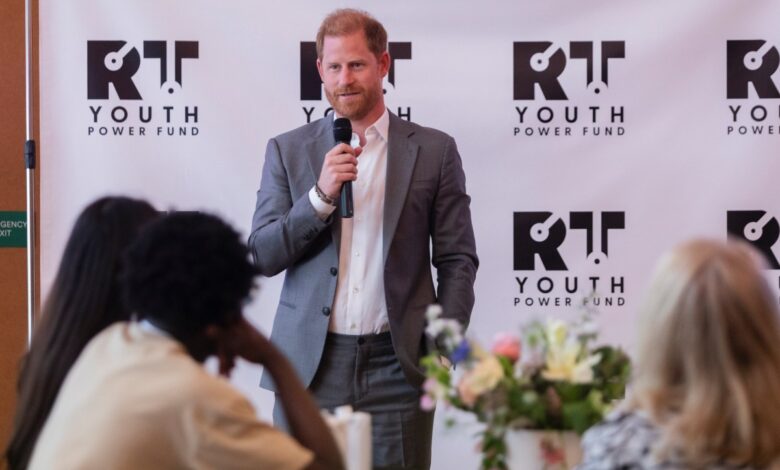Prince Harry meets, funds youth groups advocating for social media and AI safety

Prince Harry, Duke of Sussex, walked into the sunlight-lit hotel conference room in Brooklyn on Thursday to meet with a dozen youth leaders working in tech safety, policy, and innovation.
The young adults chatted away at black circular tables, many unaware of his presence until he plopped down at a table and started talking with them.
After making his way through various tables in the room, he took the stage to talk about the hopes and harms of this era of technological progress.
“Thank God you guys exist, thank God you guys are here,” he said. He spoke about tech platforms having become more powerful than governments; that these social media spaces were created based on community, yet said there has been “no responsibility to ensure the safety of those online communities.”
At one point, he said that there were people in power only incentivized by pure profit, rather than safety and well-being. “You have the knowledge and the skillset and the confidence and the bravery and the courage to be able to stand up to these things,” he said to the crowd.
The event yesterday was hosted by the Responsible Tech Youth Power Fund (RTYPF), a grant initiative to support youth organizations working to shape the future of technology. The Duke’s Foundation, Archewell, which he co-founded with his wife, Meghan, Duchess of Sussex, funded the second cohort of RTYPF grantees, alongside names like Pinterest and Melinda French Gates’ Pivotal Ventures.
TechCrunch received exclusive access to the event to chat with attendees, average age of around 22, about their work amidst the rapidly changing technological landscape.
The young people at the event were cautiously optimistic about the future of artificial intelligence, but worried about the impact social media was having on their livelihoods. Everything is moving so fast these days, they said, faster than the law can keep up.
“It’s not that the youth are anti-technology,” said Lydia Burns, 27, who leads youth and community partnerships at the nonprofit Seek Common Grounds. “It’s just that we feel we should have more input and seats at the table to talk about how these things impact our lives.”

Each turn of every conversation at the event led back to social media.
It’s consuming every part of a young person’s life, yet the clouds have the potential to become darker, the young people said at the event.
Adam Billen, 23, helps run the organization Encode, which advocates for safe and responsible AI. He’s worked on the Take It Down Act, seeking to tackle AI generated porn and other pieces of legislation, like California’s SB53 that wants to establish whistleblower protections for employees over AI-related issues. Billen, like the other young people at the event, is working fast to help the people in power understand new technology that is innovating even faster.
“As recently as two years ago, it was just not possible for someone without technical expertise to create realistic AI nudes of someone,” he told TechCrunch. “But today, with advances in generative AI, there are apps and websites publicly available for free that are being advertised to kids,” on social media platforms.
He’s heard of cases where young people simply take photos of their classmates, fully clothed, and then upload them to AI image platforms to get realistic nudes of their peers. Doing that is not nationally illegal yet, he said, and guardrails from Big Tech are loose. On these platforms, he said, it’s all too easy to see advertisements for tools to create deep fake porns, meaning it’s all too easy for children to find it too.
Sneha Dave, 26, the founder of Generation Patient, an organization that advocates for the support of young people with chronic conditions, is also worried about the sharp turn social media has taken. Influencers are doing paid advertisements for prescription medications, and teenagers are being fed pharmaceutical ads on social media, she said.
“We don’t know how the FDA works with these companies to try to flag to make sure there’s not misinformation being spread by influencers advertising these prescription medications,” Dave told TechCrunch, speaking about Big Tech platforms.
Social media in general has become a mental health crisis, the young people told us. Yoelle Gulko, 22, is working on a film to help people better understand the dangers of social media. She said walking through college campuses these days, she hears of numerous people simply deleting their social media accounts, feeling helpless in their relationship to the online world.
“Young people shouldn’t be left to fend for themselves,” Gulko said. “Young people should really be given the tools to succeed online, and that’s something a lot of us are doing.”

And they want a seat at the table to help bring change
Leo Wu, 21, remembers the exact moment that led him to start his nonprofit, AI Consensus.
It was back in 2023 when hype around ChatGPT was becoming widespread. “There was all this press from universities and media outlets about how it was destroying education,” Wu told TechCrunch. “And we just had this feeling that this was not at all the way, the attitude to take.”
So he launched AI Consensus, which works with students, tech companies, and educational institutions to talk about the best ways students can use AI in school.
“Is it a teenager’s fault for being addicted to Instagram?” Wu told us, capturing what many young people felt when asked. “Or is it the fault of a company that is making this technology addictive?”
Wu wants to help students learn how to work with AI while still learning how to think for themselves.
Working to push regulation was the main way the attendees we spoke to were looking to advocate for themselves. Some were, however, building their own organizations, putting the youth perspective at the forefront.
“I see youth as the bridge between our current government and what the responsible tech future is,” said Jennifer Wang, the founder of Paragon, which connects students with governments looking for perspectives on tech policy issues.
Meanwhile, Generation Patient’s Dave is pushing for more collaboration between the FDA and FTC. She’s also working to help pass a bill through Congress to protect patients from deceptive drug ads online.
Encode’s Billen said he’s considering supporting bills in various states that will require disclosure boxes so people know they are talking to AI and not a human, as well as ones like the bill in California, looking to ban minors from using chatbots. He’s watching the Character.AI lawsuit closely, saying a verdict in that case would be a landmark in shaping future AI regulation.
His company, Encode, along with others in the tech policy space, filed an amicus brief in support of the mother suing Character.AI over the alleged role it played in her son’s death.
At one point during the event, the Duke sat next to Wu to talk about the opportunities and dangers of AI. They spoke about the need for more accountability and who had the power to push for change. That solution was clear.
“The people in this room,” Wu said.



